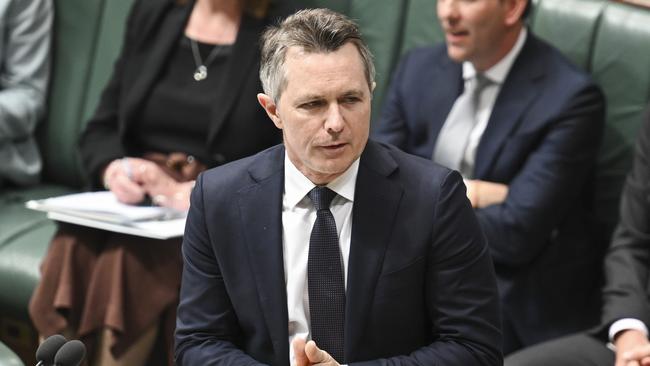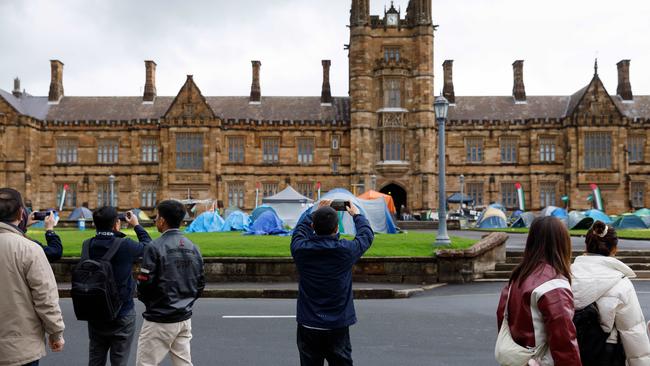Education Minister Jason Clare announces cap on international university students
Australia will reduce its intake of international students at unis and vocational colleges in a bid to strengthen integrity and curb migration.

Breaking News
Don't miss out on the headlines from Breaking News. Followed categories will be added to My News.
Australia will cut its intake of international students by nearly 20,000 following a record high number of enrolments reported this year.
On Tuesday, federal Education Minister Jason Clare announced the government would set international student commencements at 270,000 for the 2025 calendar year as part of its yet-to-be legislated national planning level.
Under the cap, publicly funded universities will take in about 145,000 new international students next year, which is consistent with 2023 levels, with another 95,000 allotted for vocational education and training (VET) courses, which the government says will bring the figures down to pre-pandemic levels.
Mr Clare said individual universities had been informed of their 2025 “indicative levels”, which would be finalised over the next two weeks.
He said the new levels administered under the international student profile would stop Group of Eight universities from taking the majority of increased student numbers after former home affairs minister Clare O’Neil issued a directive for unis to approve students based on risk.
“The fact is, for some of our big universities, they have a lot more students in their universities this year than last year,” he said.
“It’s in the vocational education sector, those private providers where the reductions will be largest.
“But I make no apology for making sure that we’re returning migration levels to pre pandemic levels, and this is part of that.”

The highly anticipated move comes as the sector has widely criticised the economic impact of the reduction in enrolments.
However, Mr Clare said the move would strengthen integrity in the sector and reduce the “shonks and the crooks” that entered the system following a dramatic increase in international students following the Covid pandemic.
“To create the impression that this is somehow tearing down international education is absolutely and fundamentally wrong. It’s about making sure that we set it up in a sustainable way for the future,” he said.
“We want students to come and study here. We want to make sure that it’s not just for a lucky few universities, but it’s for all universities.”
Figures in the year to May 2024 reported there were 810,960 international student enrolments (a 17 per cent increase on 2019 pre-Covid figures) across universities and VET courses, with commencements also 16 per cent higher at 289,230 in the same period.
At the same time the government is also under pressure to curb overseas net migration from a high of 528,000 reported in 2022-23, to 260,000 this financial year.
On July 1, the government quietly doubled the application cost for international student visas from $710 to $1600, with Mr Clare defending the decision as a way to inject revenue into education initiatives.
While the Coalition have backed the cap, Opposition spokesperson for education Sarah Henderson, and spokesperson for immigration and citizenship Dan Tehan accused Labor of mismanging the sector.
“We remain deeply concerned about the severe economic damage Labor has inflicted on regional and smaller universities, as well as private higher education providers, as a result of Ministerial Direction 107 (used under Ms O’Neil),” they said in a joint statement.
“It is shameful that Education Minister Jason Clare avoided so much scrutiny by keeping this announcement secret until today. This is another example of Labor failing the transparency test.”

SECTOR REACTS
The independent Tertiary Education Council Australia chief executive Troy Williams said independent providers needed more information and criticised the government for “drip feeding” the information through media rather than going directly to the sector.
“Right now, when contemplating the future of their institution and the jobs of their staff, all our members have is a government media release,” he said, adding that the body has sought urgent clarification from the government.
The sector representing university staff, the National Tertiary Education Union, said Mr Clare needed to guarantee all jobs at universities would be protected.
“We know too many vice-chancellors’ instinctive reaction to any policy change is cutting the staff which deliver the world-class teaching and research that is the critical selling point for international students,” national president Alison Barnes said.
“Job cuts at a time when universities have been chronically underfunded for a decade would be devastating for the government’s goal for 80 per cent of the population to have a tertiary qualification by 2050.”
Western Sydney University vice-chancellor and president George Williams said international students in Western Sydney – a key growth area for the government – were critical in dealing with Australia’s “key skill shortages,” like nursing.
He said the Western Sydney Airport slated to open in 2026, and the surrounding Bradfield mini city would also require “international students to fill key skills gaps”.
Financially, Professor Williams said a significant student cap would also restrict the university’s ability to provide equity programs, such as food outreach and support, to students with low socio-economic status.
“When it comes to our university, we have the largest number of low (socio-economic) students in the nation,” he told a senate inquiry into the proposed restrictions on Monday.
“Because what we’re hearing from those students is they’re not able to both study and eat, and international students provide a key source of revenue to support domestic students otherwise unable to study at university but for the support we are able to provide.”
More Coverage
Originally published as Education Minister Jason Clare announces cap on international university students




